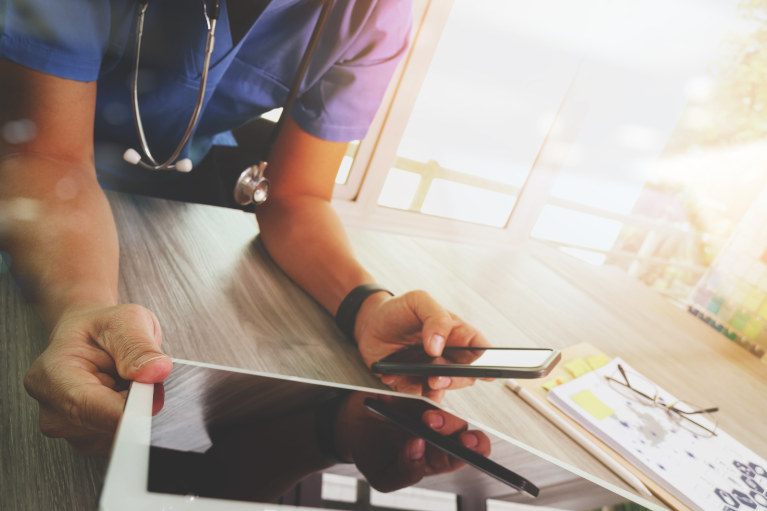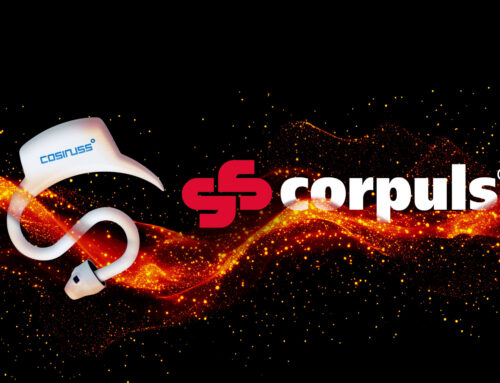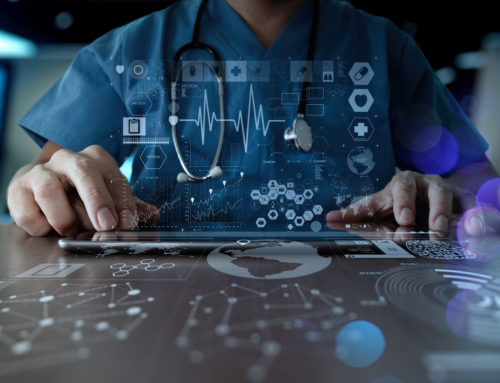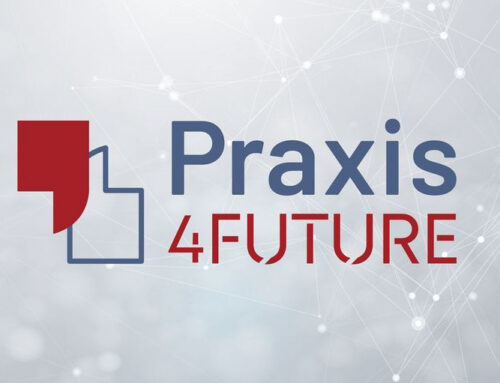Since January 1, 2022, a new telemedical service for patients has been included in the EBM catalog (“Einheitlicher Bewertungsmaßstab”) in Germany. Telemonitoring for patients with heart failure1 is now reimbursed by health insurance companies. The method, indications, implementation and quality assurance of telemonitoring in heart failure are described in detail in Annex 372 of the GBA guideline “Methods for the provision of care by SHI-accredited physicians”.
What this innovation means in detail and what contribution cosinuss° could make with the in-ear vital signs sensors is explained below.
Cooperation between medical practices and telemedicine centers
Telemonitoring facilitates timely therapeutic intervention by providing a high-frequency and systematic way of caring for patients*. Through continuous monitoring, individually optimized care for each patient can be reached and at the same time the number of personal doctor-patient contacts can be reduced to a reasonable minimum. For this purpose, a cooperation between physicians and a so-called telemedical center (“Telemedizinisches Zentrum” TMZ) takes place. Physicians, such as family doctors, cardiologists and pulmonologists treat patients primarily and make therapeutic decisions. The TMZ is responsible for data management, basic analytics and technical equipment as well as support of the patients.
Billing of telemonitoring for heart failure in EBM
Twelve new fee schedule points (GOP) for primary care physicians (PBA) and cardiologists3 have been added to the EBM catalog for the reimbursement of telemonitoring for patients with statutory health insurance, which are paid extra budgetary and thus at fixed prices.
Primary care physicians
Primary care physicians, pediatricians, cardiologists, general internists, nephrologists and pulmonologists can use the new GOP 03325, 04325 and 13578, respectively, for indication and information. For further support in the context of telemonitoring, they receive an additional flat rate once per quarter (GOP 03326, 04326 or 13579).
| Service | GOP | Rating4 | Note |
|---|---|---|---|
| Indication: personal contact as well as education and counseling of the patient regarding his/her participation in telemonitoring. | 03325 (general practitioners) 04325 (pediatricians and adolescents) 13578 (specialists (cardiology, nephrology or pneumology) |
7.32 EUR, 65 points | Can be charged per full five minutes and a maximum of three times in case of illness.5. |
| Additional fee for care: communication with the responsible telemedicine center. | 03326 (general practitioners) 04326 (pediatricians and adolescents) 13579 (specialists (cardiology, nephrology or pneumology) |
14.42 EUR, 128 points | Can be charged once in the treatment case6. |
Telemedicine centers
Cardiologists who meet the requirements for working in a TMZ can bill the new GOP 13583 for instructing and educating patients on telemonitoring. Continuous telemonitoring of patients with cardiac aggregates (GOP 13584) or with external measuring devices (GOP 13586) includes the collection, analysis and review of data, documentation as well as notification and coordination with the PBA. With individual agreement between the PBA and TMZ, participating physicians may bill a supplement (GOP 13585 or 13587) for intensified monitoring on weekends and/or holidays.
For reimbursement of the costs of external measuring devices that record data on device function as well as medical data, such as body weight, electrical heart action, blood pressure and information on general health there is the new cost flat rate 40910.
| Service | GOP | Rating7 | Note |
|---|---|---|---|
| Guidance and education. | 13583 | 10.70 EUR, 95 points |
Once in case of illness. |
| Telemonitoring by means of cardiac aggregate. | 13584 | 123.93 EUR, 1100 points | Once in a treatment case. |
| Telemedicine data retrieval and analysis for patients with an implanted cardioverter or defibrillator or an implanted cardiac resynchronization therapy system on weekends and/or holidays. | 13585 | 26.48 EUR, 235 points | Surcharge for GOP 13584 once per treatment case. |
| Telemonitoring of a heart failure patient by means of external measuring devices. | 13586 | 236.59 EUR, 2100 points | Once in a treatment case. |
| Data retrieval and evaluation on weekends and holidays by means of external devices. | 13587 | 26.48 EUR, 235 points |
Surcharge for GOP 13586 once per treatment case. |
| Equipment of the patient (by means of external devices). | 40910 | 68 EUR | once in a treatment case. |
Billing of telemonitoring in heart failure in the GOÄ
Telemonitoring in heart failure is not included in the GOÄ fee list. In the case of telemonitoring for patients not covered by statutory health insurance, an analogous calculation is made in accordance with Section 6 (2) GOÄ.
The introduction of the patients can be charged analogous to No. 33 GOÄ once at the beginning of the treatment. The monitoring of cardiac implanted aggregates is to be charged analogous to No. 661 GOÄ once per calendar week, while the use of external measuring devices is to be charged analogous to No. 653 GOÄ once per calendar week. If data management is also carried out at weekends or on public holidays, this can be billed via No. 661 and 653 GOÄ. The discussion of warning messages constitutes the service content of No. 60 GOÄ8 9.
.
| Service | GOÄ | Rating | Note |
|---|---|---|---|
| Guidance and education. | 33 | 17.49 EUR | Once at the beginning of treatment |
| Data acquisition and analysis by means of cardiac aggregates telemetrically transmitted data. On Saturdays, Sundays and public holidays: exhaustion of the fee framework up to the increase factor 3.5. |
661 | 30.89 EUR | Once per calendar week |
| Data acquisition and analysis by means of external measuring devices telemetrically transmitted data. On Saturdays, Sundays and public holidays: exhaustion of the fee framework up to the increase factor 3.5. |
653 | 14.75 EUR | Once per calendar week |
| Consultative discussion of alerts and measures initiated and/or patient-specific discussion of the need for daily triage of alerts, including on Saturdays, Sundays, and holidays. | 60 | 6.99 EUR | Per physician involved |
Telemonitoring in heart failure with cosinuss°
Important vital parameters such as pulse rate, body temperature and oxygen saturation can be reliably measured with a single in-ear device, the c-med° alpha. The acquired data provides an objective and precise insight into the patient’s general state of health and can be the basis to early detect a possible deterioration of health. Additionally, the c-med° alpha provides quality indicators that help a remotely monitoring physician in assessing the reliability of each data point. This small in-ear sensor is thus making a valuable contribution to telemonitoring by simplifying the process on both sides: the patient and the physician.
Quellen / References
- Stage NYHA II or III and a reduced pumping capacity of the heart.
- Bundesministerium für Gesundheit (2020): Bekanntmachung eines Beschlusses des Gemeinsamen Bundesausschusses über eine Änderung der Richtlinie Methoden vertragsärztliche Versorgung: Telemonitoring bei Herzinsuffizienz www.kbv.de (Abruf: 21.3.2022)
- Who meet the requirements to work in a TMZ
- Federal uniform orientation point value 2022: 11.2662 cents
- Case of illness includes treatment of the same illness within one year, i.e. in the current and the following three quarters
- Treatment case includes treatment of the same insured person by the same medical practice in a calendar quarter at the expense of the same health insurance company
- Federal uniform orientation point value 2022: 11.2662 cents
- Stolaczyk, Markus (2022): GOÄ-Ratgeber: Abrechnung des Telemonitorings bei Herzinsuffizienz, Dtsch Arztebl 2022; 119(3): A-92 / B-76. www.aerzteblatt.de (Abruf: 21.3.2022)
- Bundesärztekammer (): Bekanntmachungen: Amtliche Gebührenordnung für Ärzte (16.12.2021) www.bundesaerztekammer.de (Abruf: 21.3.2022)





